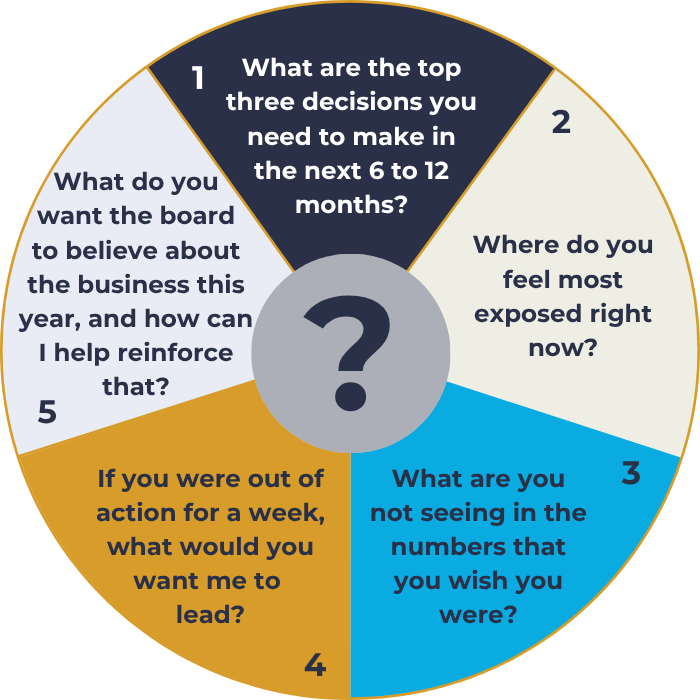During our CFO alignment sessions as part of my CFO Boardroom program, CEOs keep telling me the same thing.
They want their CFO to step up. Be more strategic. Act like a true commercial partner.
So I ask, "What does that actually mean to you?"
Surprisingly, they are often left stumped by this question.
It's not that CEOs don't know what they want. It's that they've never had to think it through, articulate it and empower their CFO to follow through.
And the same is true in reverse. I'm yet to encounter a CFO who is sitting around thinking "You know what, I'd like to just keep reconciling actuals and closing the books every month."
CFOs want to step up. Be more strategic. Act like a true commercial partner. Yet they too are often unclear about what that means in practice.
They want to lead. You want them to lead. It should be easy, right?
Not so. You're the CEO. The buck stops with you. And if you want more than BAU from your CFO, you're going to need to ask for it.
It's not fair to expect your CFO to read your mind. It's not fair to ask them to push back and be more strategic without first letting them know what good looks like and where the boundaries are.
You have to tell them exactly what you need.
That means giving them a mandate.
A mandate is more powerful than instructions or objectives because it gives them the authority and the backing to act. It steps out what's expected of them and how far they're empowered to go.
Think of your CFO like a pilot. You can hand them a set of coordinates (instructions) or give them the controls (authority). But if you don't do both, don't expect a smooth flight (or a safe landing).
Without both, they're left to guess. And when a CFO is guessing, they're more likely to stick to back office tasks and stay in their lane.
Over and over again I've had CFOs join my boardroom feeling frustrated that they've been asked to level up but given no guidance as to what that means to their CEO. Those same CEOs are very often frustrated that their CFOs aren't taking initiative.
This is why we start with alignment conversations in the CFO Boardroom. We sit down with CEOs, alongside their CFO and ask a series of specific questions.
Here are five of them you can try for yourself.
What are the top three decisions you need to make in the next 6 to 12 months?
This gives your CFO a direction to head toward. It allows them to prepare to get ahead of these decisions and to begin to build the financial narratives you need to support your them in front of your stakeholders.
Where do you feel the most exposed right now?
Everyone has an unspoken worry. A product that they know is poorly differentiated. A strategic plan weighed down by external risks. A board that's getting twitchy. This question helps surface the real concerns your CFO can help solve.
What are you not seeing in the numbers that you wish you were?
There's usually something missing in the data or the insight. Specific customer profitability. Segment performance. Market penetration in particular regions. Whatever it is, your CFO can help close any gaps in insight.
If you were out of action for a week, what projects would you want your CFO step in and lead?
This one is a good one for revealing where you trust your CFO and where you find them wanting. It will naturally highlight where else in the business your CFO can have an impact beyond finance.
What do you want the board to believe about the business this year, and how can your CFO help reinforce that?
Every board meeting is a chance to reinforce confidence in the leadership team and their plan. Your CFO should be backing up your strategic story by demonstrating what that performance can enable in the future.
These questions don't just give your CFO a better brief. They create the conditions for better leadership. They give your CFO permission to go beyond BAU and actively support you in your most important activities.
If your CFO isn't quite showing up the way you want them to, don't assume they're not capable. Ask yourself whether you've been clear enough about what you need.
And if you haven't? Have the conversation. Ask the questions.
Give them the mandate to step up.
Then get out of the way.
If your CFO asked you what you really need from them this year, would you know what to say?
I'd love to hear your thoughts.


